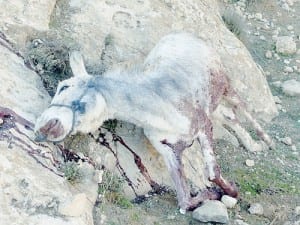By Wendy Williams
THEY say a dog is man’s best friend. And nowhere is this truer than in the UK.
But until very recently the same could not be said for Spain.
Dogs chained up around the countryside and dumped by the roadside, donkeys thrown out of towers or left in the midday sun, their hooves tied together. These are just some of the shocking images that come to mind.
In part due to a lack of money, and part the result of cultural attitudes, the Spanish – in general, it should be stressed – have never shown the same love for animals as the British, or say, Germans.
However, remarkably, this seems to be changing.
As the country gains in wealth and stability, more and more Spaniards are taking the lead from the over-zealous animal-loving expat community.
It has just emerged, for example, that an altruistic millionaire recently left all of her fortune to three animal charities.
The single woman from Madrid left a total of three million euros to 50 donkeys, 225 lynxes and 400 cats and dogs.
Never before has a Spaniard left so much inheritance to animals.
So could Spain be a new nation of animal lovers?
A survey by the animal health laboratory Intervet/Schering-Plough recently found that 98 per cent of Spaniards believe you should go to jail if you abuse an animal.
They also believe that laws need to be tightened to criminalize cruelty.
Last year the Catalan parliament voted by an overwhelming majority to ban bullfighting after officials were presented with the signatures of 180,000 people demanding an end to the carnage.
Earlier this year, the iconic tradition of bullfighting was banned from being shown live on TV.
On top of this there are now a plethora of animal charities springing up across the country with over 50 in Andalucia alone.
Many of these were set up by Spaniards, who were appalled by what they saw here and decided to take up the slack.
Spaniard Rafael Benjumea, who has worked for El Refugio del Burrito, a Donkey Sanctuary, in Fuente de Piedra, for the last four years, certainly believes things are changing.
He said: “I think the difference between the British and Spanish attitude to animals goes with the level of social advancement.
“Up until the last 20 or 30 years Spain was very impoverished and people had to tend to their basic needs, they simply didn’t have the money to care for their animals.
“It is all about priorities. Now things are more advanced and you can see the wealthier cities like Barcelona and Madrid showing more interest in animal welfare, with Andalucía, which has always been poorer, catching up too.”
And he added: “Our charity started eight years ago with 300 members, most of whom were English, now we have grown considerably and have 9,500 members with about half of them Spanish.”
It is not long since Spaniards had no money to care for themselves let alone animals
Of course, the British are long known for their passion for pets. They love to give to animal charities and – incredibly perhaps – there was a Royal Society for the Prevention of Cruelty to Animals (RSPCA) before there was a charity to prevent cruelty to children.
Two years ago it emerged that the British public had given more to a donkey sanctuary than to the three most prominent charities trying to combat violence against women.
For some this was a sure sign that the country’s priorities were a little askew.
According to the latest figures, 14 per cent of the 10.6 billion pounds donated in the UK goes to animal charities.
And Britain ranked eighth place in the CAF World Giving Index with 53 per cent of people giving to charity.
In comparison, Spain only came in at 91st with just 27 per cent, suggesting that here, charity certainly begins at home.
Marjorie Bedford, an administrator for Costa del Sol animal charity ADANA, believes this is part of the problem.
“Brits are certainly more used to giving to charities,” she said. “Sadly, animals have been more of a tool than a pet here in Spain.”
This is reflected in the late arrival of Spanish charities dedicated to animals.
While the RSPCA can proudly claim to be the world’s first animal welfare charity, founded in 1824 in contrast, ADDA, the first Spanish NGO devoted to animals only arrived in 1976. With this in mind, it is little wonder the Spanish have often been criticised abroad for their lack of animal compassion.
From the abandoned animals that litter the countryside, to the incidents of cruelty at local fiestas, the opinion of many is that animal welfare is simply not a priority in Spain.
Above all, of course, the country has come under fire for its long held tradition of bullfighting.
But the list doesn’t end there.
Last issue we revealed a Huelva man had been arrested for keeping an eagle and a wolf tied up at his house.
And in 2008 the Olive Press brought you the shocking story about wealthy hunters Davíd Jimenez and José de la Flor, who were jailed for killing defenceless tigers and lions they had bought from a zoo.
The group was caught red handed in December 2005 when they posed with the bullet-ridden tiger they had ‘can hunted’ on the huge estate near the village of Monterrubio, in Extremadura.
The reaction of many expats was that something like this would never happen at home.
But, like everything, there are two sides to every story.
Many Spaniards are now taking up the cause and, let us not forget, not every Briton is a
credit to the national obsession.
The opinion of many is that animal welfare is simply not a priority in Spain
Last Christmas the Olive Press revealed how it was a Spaniard who had to pick up the pieces after Briton Suzanne Jenkins – dubbed the ‘horse killer’ – had fled Spain after dozens of her animals died due to cruelty.
It was thanks to new owner Juan Berges Torres the remaining horses were saved ,and he spent over 10 months working with vets and nutritionists to nurse the horses back to health. “I didn’t do it for the money, just for the horses,” Berges told the Olive Press.
This trend towards compassion has also been noticed by Wendy Thorne, president of Costa Animal Society (CAS), based in Nerja, now celebrating its 25th year.
She said: “Things are changing for the better; we now have more Spaniards joining the society and donating money than before.
“British culture is still far more animal orientated. But then it is not very long since many Spaniards had no money to care for themselves let alone their animals.
“Now they have more money, and the younger generations show a lot more concern.”
But she added: “Although the Spanish are becoming more aware the government still doesn’t give money to animal charities.
“The town halls would rather save the palm trees.”
So like everything, it all comes down to money.
And in the wake of the recession many charities, which are almost entirely dependant on donations from the public, are again struggling.
“If it wasn’t for our parent company in the UK we would simply not survive at the moment,” said Benjumea from the Donkey Sanctuary.
But at least the ball has certainly started rolling and there is a growing awareness in Spanish society about animal welfare.
They may still consider their pets as animals rather than companions unlike their British counterparts. But they are considering them.
Hopefully, as the economy picks up over the next year or two, more and more Spanish will realise that charity not just begins at home… but pets and animals also deserve some charity outside of it.











The statement “Last year the Catalan parliament voted by an overwhelming majority to ban bullfighting …” is more than a little misleading. The vote was 67 for the ban, 59 against the ban, 5 abstentions, i.e. the ban passed with 51% of the vote, the slimmest of majorities.
Forgive my previous mistake. The 67/59/5 vote was not the final vote. The final prohibition vote was 68 for the ban, 55 against the ban, 9 abstentions : the ban passing with only 51.5% of the vote.
I think it boils down to the “animals don´t have a soul” catholic theory, which English (mainly protestant) people cannot understand. Of course they have a soul. They are living, breathing, intelligent beings – like humans. In many cases far more intelligent than the moronic behaviour displayed by humans. What would you rather do, ruff and growl a bit or totally destroy the planet???
No mention of the Brits going back to the UK and leaving their pooches and moggies locked up in the house; albeit with food and water but animals will eat whatever is in front of them rather than consider leaving some for tomorrow. And why do they leave them locked up? Because they are doing the equivalent of a moonlight flit and do not want anyone (especially people they may owe money to) to know they are planning to leave.
The RSPCA is a very controversial organisation. Take a look at these sites and then please try to ensure that Spain does not make the same mistakes!
SHG
http://the-shg.org
RSPCA-Animadversion
http://rspca-animadversion.org.uk
RSPCA Injustice Blog
http://www.rspcainjustice.blogspot.com/
SHG Press releases
http://the-shg.org/SHGPressReleases.htm
If anyone derives pleasure from inflicting pain and suffering on a dumb animal then they really should be disposed of. I would be more than happy to do that job and please believe me I AM NOT KIDDING!
Spain , Greece, Turkey and all the other countries that have no laws to protect animals, start thinking, you are losing tourists by the thousands because of the cruelty…..
Very interesting, well balanced article. It´s no bad thing that Spaniards are taking more interest in the care of animals. But they also take a hell of a lot more care of their children than the case in the UK. It´s always a delight to see the way children are greeted with ¡hola guapa/o! in the street by young and old. Priorities? Personally I think we have a lot to learn from the Spanish when it comes to valuing our kids and letting them know they are wanted.
When I worked in Holland a few years back, their people did not casually greet children in the way you described either, so does that mean they don’t value their kids, Yerma? You just cannot apply that argument to other cultures.
The family unit is certainly strong in Spain, but to suggest that means parents “take a hell of a lot more care of their children than the case in the UK” is, of course, complete and utter codswallop (in my opinion).
I would like to know which part of Andalusia you are referring to as where I live just outside Sevilla cruelty is well and truly alive not a day goes by when I don’t see an abandoned dog cat that is starving to death while the world goes by here animals are looked at as vermin nobody cares and when you mention it most will candidly tell you they don’t like animals I am looking at getting out of here this effects your mental and physical well being(I go around with a large bag of dog-cat food to feed the animals that I find.
me parece un insulto hacia España decir que los españoles nunca hemos demostrado amor hacia los animales, un insulto de los que enfadan, y mucho, en España hay tontos que maltratan animales, tenemos la desgracia de tener la tradicion de las corridas de toros, pero que a nadie se le olvide que esta tradicion, es Española, Portuguesa y Francesa, no solo española. por ultimo, el posible maltrato a los animales lo llevan a cabo mentes subdesarrolladas, no “los españoles”… no hagas demagogia a costa de la imagen patetica que tiene mi pais en el exterior. gracias.
AH!, que el que escribio esto tambien es Español, ahora entiendo, los extranjeros no hablan mal de España, solo los españoles nos insultamos a nosotros mismos. vale tio
Pepe raises a good point in his commentary. The history of Spain provides examples of kindness and concern, as well as cruelty, toward animals. Cervantes, in Don Quixote, wrote of two boys as “worse than the Devil himself” for tormenting Sancho’s donkey and Don Quixote’s horse Rocinante. Likewise, in his Colloquy of the Dogs, he wrote sympathetically of how a dog chained to a wall could not even reach the scraps thrown to him before “light-footed cats.” Don Carlos, son of Philip II, was criticized for his cruel treatment of animals as well as servants, and Oliva Sabuco wrote that we could learn a great deal about love from animals who had “mortal souls” and the ability to make choices. One need go no further than the paintings of Velásquez and Goya to see the pet dogs of the elite, and Murillo painted a working class Holy Family with a little white dog. The sheepherding guild of the Mesta even had some standards and guidelines for the appropriate treatment of sheepdogs and sheep, as well as penalties for their infringement. Bullfighting, cockfighting and neglect are obviously there in the history of Spain as well, but there were those who always had a different vision of how humans should treat other animals.
Abel A. Alves, author of the forthcoming book The Animals of Spain: An Introduction to Imperial Perceptions and Human Interaction with Other Animals, 1492-1826 (Leiden and Boston: Brill, 2011).
the above comment that animals are dumb i do not believe this,it is the humans that are dumb God gave man us our animals for our pleasure and sorce of food, if an animal knows it is to harmed they sence it they are inteligent and innocent, it is man that is corrupt not our trusting companions, wether people believe in God or not they will be facing judjment when they die .Chris